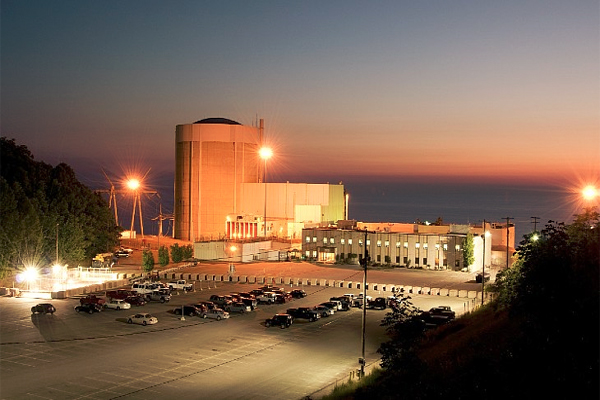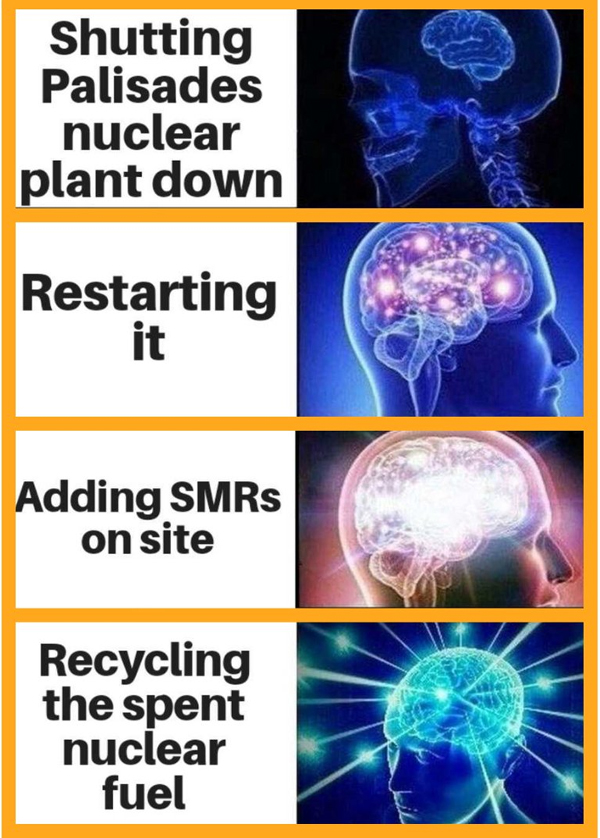- A long-term power purchase agreement signed between Holtec Palisades Energy and the non-profit Wolverine Power Cooperative is described as a “significant milestone” towards restarting the 800 MW Palisades nuclear power plant in the USA.

World Nuclear News
LONDON
EnergiesNet.com 09 25 2023
Under the multi-decade agreement, Wolverine commits to purchasing two-thirds of the power generated from a reopened Palisades, with Wolverine’s partner Hoosier Energy purchasing the balance. It also includes a “contract expansion provision” to include one or two small modular reactors that Holtec plans for the site.
Holtec International CEO Kris Singh said: “We are well aware that, although we see no real obstacles ahead, re-powering of a dormant plant such as Palisades would be a feat that has never been achieved before. Hopefully, the Palisades revival would encourage our allies, Germany and Japan, who have many dormant nuclear plants, to adopt a similar course.”
“We thank Governor [Gretchen] Whitmer, the Michigan legislature, the US Department of Energy led by Secretary [Jennifer] Granholm, and the people of Michigan whose enthusiasm to render Palisades into a bastion of new clean energy generation has encouraged us to launch the odyssey of restoring Palisades energy generation.”
Kelly Trice, President of Holtec Nuclear Generation and Decommissioning, said: “The executed power purchase agreement represents a significant milestone in our journey towards reopening the plant, a historic moment for Michigan and the country. The repowering of Palisades ensures Michigan has sufficient energy to meet future demand and mitigate the impact of climate change, while creating hundreds of high-paying Michigan jobs, expanding the local tax base, and unleashing economic opportunity within the region and beyond.”
Wolverine’s member rural electric cooperatives supply homes, businesses and schools across more than half of Michigan’s lower peninsula. Its power supply is already 60% carbon-free, and it hopes that the Palisades agreement will increase that figure into the future.

Eric Baker, CEO of Wolverine, said: “Ensuring reliable and affordable electricity in Michigan is crucial. The restart of Palisades offers a practical, long-term solution to electric reliability in our state and aligns with Michigan’s ambitious goals to reduce carbon emissions.”
Palisades, a single-unit power plant, began commercial operation in 1971. Entergy announced in 2016 its plan to close Covert, Michigan-based Palisades, with the US Nuclear Regulatory Commission approving in 2021 the transfer of the licence from Entergy to Holtec for the purposes of decommissioning it. The 805 MWe pressurised water reactor was removed from service – after 50 years – by Entergy on 20 May last year, and defuelled by 10 June.
The sale to Holtec completed later that same month and Holtec announced a few days later that it was applying for federal funding to allow it to restart the plant. It was unsuccessful in the first round of the US Department of Energy’s Civil Nuclear Credit programme but announced in December that it was reapplying. Holtec says it is “working cooperatively with the Department (of Energy) to move the loan application process forward. Holtec has also participated in several constructive public meetings with the US Nuclear Regulatory Commission staff to discuss the proposed regulatory path to reauthorise operations at Palisades within the agency’s existing regulatory framework”.
Holtec says that the previous decision to close Palisades had been a financial one, but said that the financial case had been transformed, especially with “the era of ascendance of clean energy with nations committed to combating the escalating carbon burden in the environment that threatens continued habitability of our planet”.
It is not yet known how long Palisades would be allowed to operate for if it gets the go-ahead to restart. However in 2019 the US Nuclear Regulatory Commission approved Florida Power and Light’s application for a 20-year subsequent licence extension for Turkey Point units 3 and 4 – pressurised water reactors which entered commercial operation in 1972 and 1973 – which was the first time the regulator had issued licences authorising reactors to operate for up to 80 years.
world-nuclear-news.org 09 13 2023











